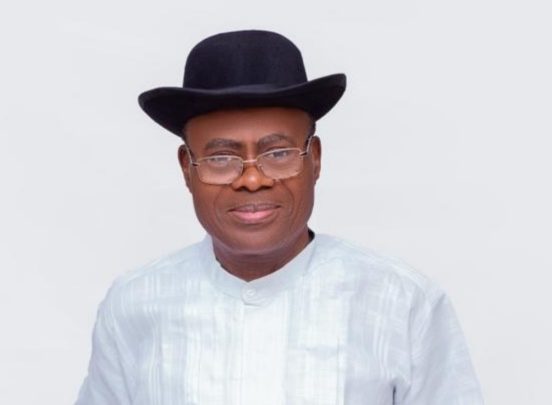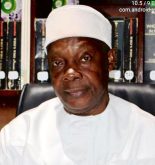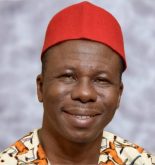By Udeme Nana
But for a twist of fate , he would have been in the engineering sector grappling with Integrated Circuits or Artificial Intelligence, electrical systems in automobiles, power generation equipment and allied tasks. That was his childhood aspiration and he prepared himself adequately to engage in that field. He had earned credits in Mathematics, Physics , Chemistry, Technical Drawing, etc, and had been admitted to the University of Nigeria, Nsukka to study for a degree in Electrical / Electronics Engineering. He served in the defunct National Electric Power Authority, NEPA , while undergoing the one year compulsory National Youth Service Corps scheme for Nigerian graduates. Thereafter, the gentleman proceeded to Cardiff in the United Kingdom to study for a Masters degree in his dream profession specializing in micro- electronics, a branch of electronic engineering which is the foundation of micro – chip technology. On his return to Nigeria, he worked as an Installation Engineer handling Caterpillar generators for clients of his employer, United Africa Company, UAC, Tractor and Equipment Division.
Had the likes of Edidem Bassey, popularly known as “The Jesus of Ikot Ekpene” , a prophet from his Uruk Uso village , renowned all over Nigeria while he was growing up, and his competitor then , Bishop Otong from Ndiya, a neighbouring village , predicted that the young engineer would end up in the murky waters of journalism and rise to a commanding height as the Editor of a well respected national daily newspaper, his family members, relatives and friends would have laughed it off as a big joke. They would have received it like Sarah, Abraham’s wife did when told that she would bear a child at the ripe age of 90 ! Somehow , those prophets didn’t take a gamble because they didn’t see him in their spiritual radar.
Such a prophecy would have been dismissed by a wave of the hand because rarely do professionals in a core science course of study like Electrical / Electronics Engineering venture into a field such as journalism. The sectors do not , at first glance , show similarities. They are not close by even in the dictionary. They seem to be worlds apart as entry into Journalism doesn’t require credit passes in science subjects except Mathematics. In his era , journalism practice didn’t even bother about any special entry requirements. Anyone, with a flair or without , could drift in, learn the skills on the job and excel. Except for the entry requirements to study for a degree or diploma in Mass Communication in Universities or Polytechnics in Nigeria, not much has changed because there are still many practitioners without prior professional training in the field but who have become dominant players in the media sector at present.
However, his trajectory is a proof of a rule which states that with ‘favourable learning conditions, investment in effort and opportunities, anyone can learn anything they want’ . According to this media consultant, while in Cardiff, Wales, in the United Kingdom,
“I found that consumer engineering was the same as consumer journalism; there are a lot of people who still buy goods they don’t need and cannot use those purchases optimally, so when I came back to Nigeria, I started writing such stories for Daily Times and they took interest.’
Unlike many others who drifted into journalism from other fields, it wasn’t the thrill of seeing his byline in print, not the chance to meet and interview important people in the society or to cultivate a circle of rich business moguls and politicians. It wasn’t the lure to set any agenda, gain freebies or influence. He wasn’t fired into the trenches of journalism to change the society or to pursue fame. He used to write about Radio and Television sets, electric lamps, cars , refrigerators, air conditioners, cables and various technological gadgets, their uses and how to take well informed purchase decisions. He used to analyse the science behind the gadgets, and the dangers they posed to life and the environment. The Engineer wrote regularly to educate consumers about which electronics to buy by explaining the capacity and usefulness of such goods and why they should buy various electronic gadgets wisely.
The medium of his skillful exertions then was Business Times Newspaper, a publication in the stable of Daily Times which had a page on consumer affairs. That hobby attracted the attention and interest of Chief Onyema Ugochukwu and Stanley Egbochukwu, who, at that time were Editor and Deputy Editor of Business Times respectively, and they tapped him away from his job of installing generators for UAC and writing at whim into the robust hub of journalism in Nigeria. That is how the Engineer-turned-Journalist joined the defunct Concord Press as an ‘Industry Correspondent’ in Business Concord with Stanley Egbochukwu as the Founding Editor. He gained promotion as a Deputy Editor of the Business Newspaper and later, Editor of the specialized Newspaper. In 1989, he was catapulted to the zenith of journalism practice as Editor of National Concord Newspaper.
On the surface, engineering, his first love, seems unrelated to the professional practice which lifted him and made him popular in the country. However, his entry into active journalism made him to see, in sharp relief , some common grounds between engineering and journalism. The fellow of the Nigerian Guild of Editors discovered that newspaper layout and design was related to technical drawing and engineering design. He realized also that marketing is critical to both professions. According to him , “as an engineer, one looks at the peculiarities of the potential customers of the end product. This also applies to the media industry as media products are deliberately targeted at various segments in the public sphere. Market survey is also vital in both sectors as a means of stimulating the market at various levels. In addition, management of resources is universal to all known fields of human endeavour.”
In addition , ‘in the area of professional ethics, the values are the same ; the need for precision, quality control, correct facts and correction when at fault and truthfulness. This underscores why engineering firms recall products when discovered to be faulty. In journalism, one retracts, apologizes and publishes a correction’.
He may not have pioneered Business journalism in Nigeria as that honour rightly belongs to someone else who, incidentally, shares the same surname and also hails from the same State. That man, Chief Effiong Essien, was plucked from his schedule at the Central Bank of Nigeria to midwife the Business Times Newspaper, in the stable of the legendary Daily Times behemoth. However, Nsikak Essien charted a path for himself and grew on the specialized beat of Business journalism to perch on the pinnacle of journalism practice in Nigeria. He mixed it with the array of talents in the newspaper industry in a storied era of the sector when National Newspapers sold 500, 000 copies daily.
This is the Engineer-turned-Journalist whose father, Augustus Essien, a medical doctor, and mother, Mrs. Evelyn Essien, a civil servant, attended Methodist Primary School, Ibong in Ikot Ekpene. He had his Secondary School education at Regina Coeli College, Essene, Ikot Abasi , all in Akwa Ibom State.
As he turns 72 on Monday, February 20, 2023, this man who abandoned the tester screw driver and multimeters used by electrical / electronic engineers for the pen is now a successful publisher and media consultant . He is also one of the subscribers to the Book Club initiative in Akwa Ibom State as a Patron of Raffia City Book Club in Ikot Ekpene.
Nsikak Essien is another proof that someone can add value to himself and adapt in any direction when opportune.
Happy 72nd birthday , Ete !
Dr. UDEME NANA, a Mass Communication Scholar is the Founder of Uyo Book Club and the driver of the Book Club initiative in Akwa Ibom State.




